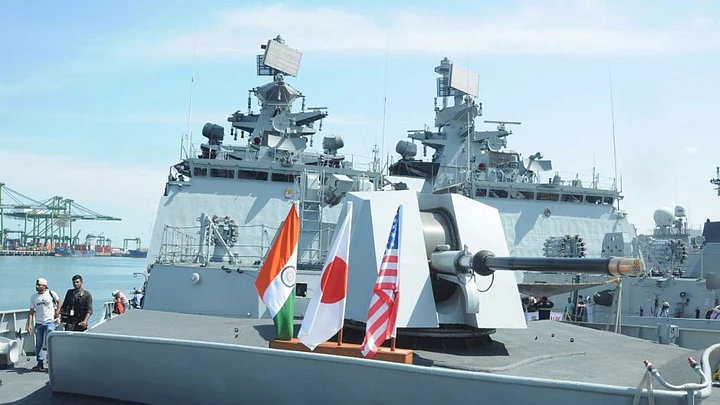The US, Japanese and Indian navies, on 10 July, began the Malabar Naval Exercise 2017 aimed at achieving deeper military ties between the three nations.
Indian, Japanese and US maritime forces have an understanding and knowledge of shared working environment at sea. As members of Indo-Asia Pacific operations, the three maritime forces will look forward to continuing to strengthen the bonds and personal relationships, a press release said.
The Malabar exercise comes amid the military standoff between armies of the India and China in the Sikkim section and Beijing ramping up its Naval presence in South China sea.
US’s Rear Admiral WD Byrne Jr said that he hoped all nations were watching what India, US and Japan are doing.
Coming together is important in order to learn how to inter-operate with each other in peacetime and crises.
Warships, submarines, aircraft and personnel from India, Japan and the US are to participate in the 21st edition of the Malabar exercise in the Bay of Bengal from 7-17 July, amid reports of the presence of Chinese warships in the Indian Ocean.
Malabar 2017 is the latest in a continuing series of exercises that has grown in scope and complexity over the years to address the variety of shared threats to maritime security in the Indo-Asia Pacific, a US embassy statement said.
The exercise will feature both ashore and at-sea training. Medical operations, damage control, explosive ordinance disposal, helicopter operations and anti-submarine warfare would also take place.
The at-sea exercise includes events such as submarine familiarisation, air defence exercises, medical evacuation drills, surface ware fare exercises, communication exercise and search and rescue operations.
While ashore in Chennai, training will include subject matter expert and professional exchanges on carrier strike group operations, maritime patrol and reconnaissance operations, surface and anti-submarine warfare, medical operations, damage control, explosive ordnance disposal (EOD), helicopter operations, and visit, board, search and seizure (VBSS) operations.
The at-sea portions will be conducted in the Bay of Bengal and are designed to advance participating nations' military-to-military coordination and capacity to plan and execute tactical operations in a multinational environment.
Events planned during the at-sea portions include liaison officer professional exchanges and embarks; a photo exercise; submarine familiarisation; high-value unit defence; air defence exercises; medical evacuation drills; surface warfare exercises; communications exercises; search and rescue exercises; helicopter cross-deck evolutions; underway replenishments; gunnery exercises; VBSS exercises; and anti-submarine warfare, the release said.
Participants from US Navy
- Nimitz-class aircraft carrier USS Nimitz (CVN 68) with embarked Carrier Air Wing 11
- Guided-missile cruiser USS Princeton (CG 59)
- Guided-missile destroyers USS Howard (DDG 83), USS Shoup (DDG 86), and USS Kidd (DDG 100)
- A P-8A Poseidon aircraft; and a Los Angeles-class fast-attack submarine.
Indian, Japanese and US maritime forces have a common understanding and knowledge of a shared working environment at sea. Each iteration of this exercise helps to advance the level of understanding between our Sailors, and we hope to be able to continue this process over time. As members of Indo-Asia-Pacific nations, our maritime forces are natural partners, and we look forward to continuing to strengthen our bonds and personal relationships, it said.
The Japan Maritime Self Defense Force ships JS Izumo (DDH 183) and JS Sazanami (DD113) will be participating in the exercise. The Indian flotilla is expected to have six to seven frontline warships.
(At The Quint, we question everything. Play an active role in shaping our journalism by becoming a member today.)
